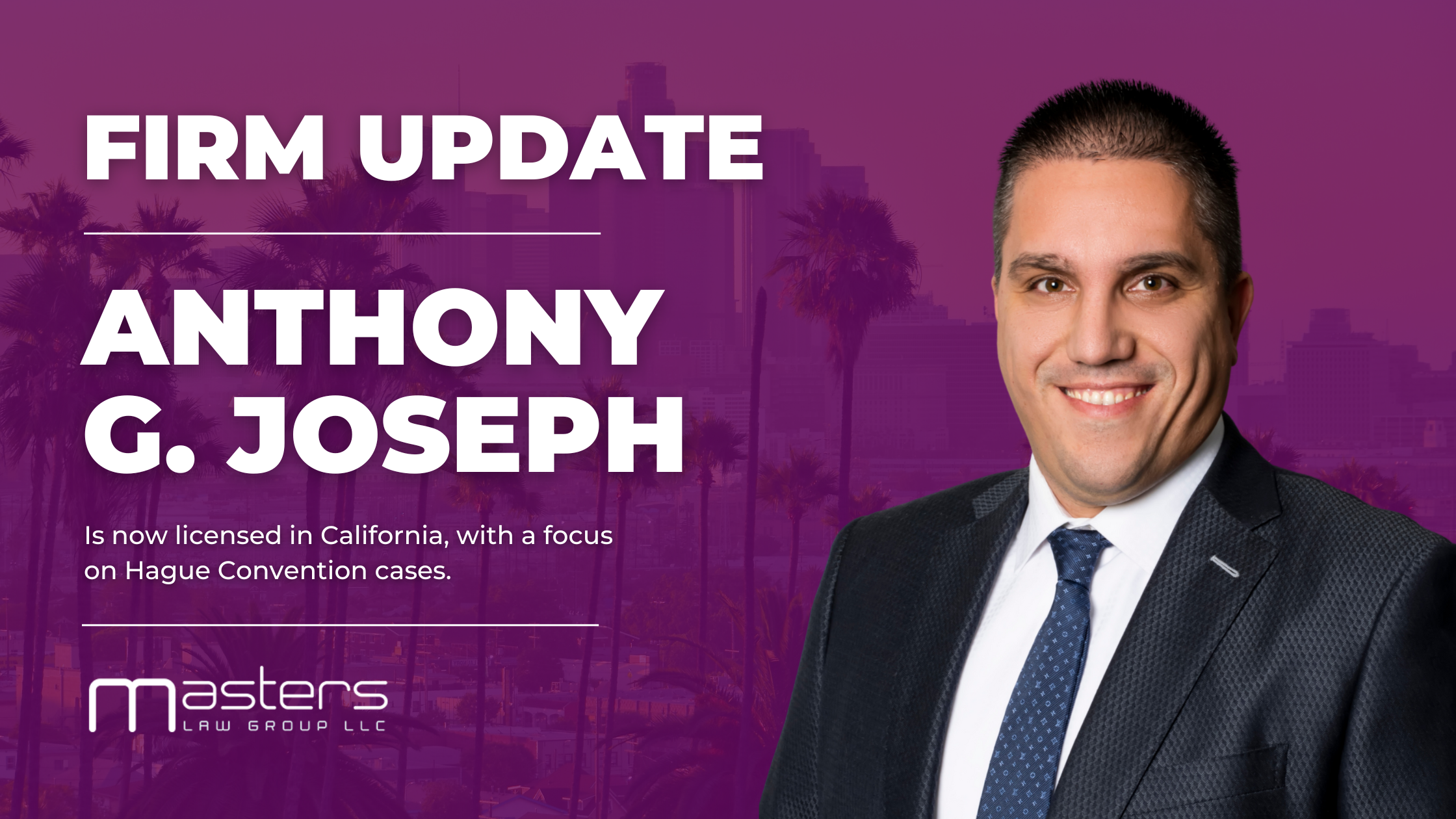Anthony G. Joseph Is Now Licensed in California; A New West Coast Resource for Hague Convention Cases
Big news for families and practitioners: Attorney and Partner Anthony G. Joseph is now licensed to practice family law in California, focusing his practice on Hague Convention cases involving international parental child abduction and cross-border parental disputes.
If you or someone you know is facing the wrenching uncertainty of a child taken or retained overseas, or you’re an attorney who needs a trusted co-counsel on Hague matters, Anthony’s new California admission brings proven experience and a strategic, compassionate approach to one of the most time-sensitive areas of family law.
What Is the Hague Convention and Why It Matters
The Hague Convention on the Civil Aspects of International Child Abduction (commonly called “the Hague Convention”) is a multilateral treaty designed to provide a prompt mechanism to help secure the return of children wrongfully removed to or retained in a member country. The treaty’s core purpose is to deter international child abduction by restoring the status quo and returning children to the country of habitual residence, where custody and visitation disputes are to be decided under domestic laws.
Why it matters: When a child is taken across international borders, ordinary family law remedies are often too slow or ineffective. The Hague process provides a structured, emergency-style mechanism to request return, but success depends on speed, evidence, and legal strategy. That’s why having experienced, licensed counsel in the forum court (in this case, California) matters so much.
Why Anthony’s California License Matters
There are three practical reasons Anthony’s California admission is important:
- Jurisdictional Access: California courts handle Hague petitions under state law and federal implementing statutes. Having counsel licensed in the state helps ensure direct courtroom access, the ability to file without delay, and familiarity with local judges, clerks, and procedural expectations.
- Speed and Responsiveness: Hague cases are time-sensitive. The Convention emphasizes prompt proceedings; typically, courts aim to resolve return applications quickly. A California-licensed attorney can file immediately, attend ex parte hearings if necessary, and respond to opposing filings without the logistical delays that out-of-state counsel sometimes face.
- Local Practice Knowledge: Every state has its own nuances, from local rules to judicial tendencies. Anthony’s admission in California lets him combine international Hague experience with knowledge of how California courts handle evidentiary issues, urgency motions, service of process, and enforcement.
If you live in California (or a child has been brought to California), Anthony’s presence on the ground means you have an attorney who can move quickly and directly where it matters most.
Anthony’s Approach to Hague Convention Cases
Hague Convention matters require an unusual blend of legal precision, cultural awareness, and practical crisis management. Here are the central pillars of Anthony’s approach:
1. Rapid Triage and Fact Gathering
Time is the enemy in Hague cases. Anthony begins with a rapid intake to identify the child’s habitual residence, the timeline of removal or retention, relevant custody orders, passports, and travel evidence, and any documentation showing consent or lack thereof. Even small details, such as airline manifests, passport stamps, phone records, or eyewitness statements, can change the course of a Hague petition.
2. Clear Legal Analysis
Not every international move is a Hague “wrongful removal.” Anthony focuses on whether there was a “custody right” in the country of habitual residence at the time of removal and whether the removal or retention was in breach of that right. He analyzes available defenses (for example, consent, acquiescence, or grave risk of harm) and builds a precise legal strategy tailored to the facts and the forum court.
3. Tactical Litigation and Coordination with Foreign Counsel
Many Hague matters require parallel coordination with counsel in other countries, whether to obtain evidence abroad, serve process, or negotiate a diplomatic route. Anthony works collaboratively with foreign counsel and consular officials when appropriate, balancing litigation and diplomacy to achieve a timely resolution.
4. Trauma-Informed Client Care
These cases are emotionally fraught. Anthony pairs legal urgency with compassionate client communication, explaining options, managing expectations, and connecting families with practical supports like local law enforcement liaisons, child welfare agencies, or counseling referrals.
5. Post-Return Planning
A successful return under the Hague Convention is not the end; custody issues still need resolution in the child’s habitual residence. Anthony helps clients prepare for follow-up matters: custody hearings, safety plans, supervised exchanges, and compliance monitoring.
Common Hague Defenses and How Anthony Handles Them
The Convention contains a limited set of defenses that respondents commonly raise. Anthony’s defense-focused experience makes him adept at preempting and rebutting these arguments:
- Consent or Acquiescence: The respondent may assert that the other parent consented to the move or later accepted it. Anthony investigates the timing, scope, and context of any alleged consent, using contemporaneous messages and records to challenge vague or belated claims.
- Grave Risk of Harm: This is one of the narrowest but most serious defenses. If a respondent claims returning the child would pose a grave risk of physical or psychological harm, Anthony demands specific, corroborated evidence and explores less disruptive alternatives like supervised return or protective orders to mitigate harm while preserving the Convention’s goals.
- Not Habitual Residence: If the respondent argues the child was already habitually resident in the new country, Anthony compiles multi-factor evidence (school records, social ties, parental intent) to demonstrate where the child’s center of life truly was at the relevant time.
- Procedural Defenses: Failures in service, jurisdictional defects, or statute-of-limitations arguments are common tactics. Anthony’s litigation experience helps him anticipate procedural traps and ensure filings comply with California practice.
Because these defenses can be outcome-determinative, Anthony emphasizes early forensic collection of communications, travel documents, and third-party testimony.
The Typical Hague Process in California
While every case is different, here’s a practical roadmap of how a California Hague case commonly proceeds:
- Emergency Intake and Petition Drafting: The attorney files a petition for return of the child in the appropriate California court, typically accompanied by a verified declaration describing facts, custody history, and supporting documents.
- Service on the Respondent: The respondent must be given sufficient notice. Hague cases often use expedited service methods and may involve foreign service rules when the respondent is abroad.
- Preliminary Hearings and Temporary Orders: Courts may hold immediate hearings to evaluate the petition, consider temporary custody or return orders, and set briefing schedules.
- Fact Discovery and Evidentiary Hearings: The court may order evidence exchange, declarations, or live testimony.
- Decision Under the Convention: The court decides whether the removal or retention was wrongful and whether any defenses apply. If the court orders a return, mechanisms are available for supervising the safe physical return of the child.
- Enforcement and Follow-Up: If the respondent refuses to comply with a return order, enforcement mechanisms include contempt proceedings and coordination with federal agencies or foreign authorities. Conversely, if the court denies return (e.g., established grave risk), the case proceeds on custody merits in the country of habitual residence.
Anthony’s role is to navigate each stage efficiently and to advocate for solutions that help protect the child’s welfare while respecting the Convention’s mandates.
Practical Tips for Parents Who Suspect an International Removal or Retention
If you believe a child has been taken out of their habitual residence or retained abroad, consider these immediate steps:
- Act Quickly: Hague cases favor speedy action. Collect flight records, passport information (including stamps), communication logs, and any custody orders.
- Document Everything: Save texts, emails, social media messages, and any written agreements. Photograph boarding passes, ticket purchase confirmations, and hotel bookings if available.
- Contact Police and Your Local Central Authority: Report the abduction to local law enforcement and contact the Central Authority in your country (in the U.S., the Department of State’s Office of Children’s Issues). They can help coordinate international steps.
- Retain Hague Counsel: Secure an attorney with Hague experience and, when possible, admission in the forum state. Anthony’s recent California admission allows him to file locally and marshal resources quickly for cases involving California.
- Preserve Safety: If you fear physical danger to the child or yourself, alert law enforcement and consider emergency protective orders where appropriate.
These actions help preserve the evidence and build the foundation for a Hague petition.
When to Involve Foreign Counsel or Consulates
International cases often require coordinated legal work across borders. Anthony routinely coordinates with:
- Foreign Counsel to gather evidence, serve documents, or seek local protective measures.
- U.S. Consular Officials to assist with practical matters like verifying documents, facilitating safe travel, or liaising with foreign authorities.
- Central Authorities in the foreign country that implement the Hague Convention at the governmental level.
This networked approach increases the speed and effectiveness of return efforts and reduces the risk of procedural gaps.
Why Families and Referring Attorneys Choose Anthony
People choose Anthony for several consistent reasons:
- Practical Urgency: He understands the time-critical nature of Hague matters and prioritizes action without sacrificing legal precision.
- Strategic Collaboration: He works well with foreign counsel, consular offices, and other stakeholders to create multi-front solutions.
- Clear Client Communication: Families appreciate straightforward explanations and realistic assessments.
- Local Courtroom Capability: With California licensure, Anthony can appear in person, meet clients locally, and pursue urgent relief before California judges.
For referring attorneys, Anthony offers dependable co-counsel services: quick intake, meticulous petition drafting, and courtroom representation in California.
Realistic Expectations
It’s important to be realistic about outcomes. The Convention’s goal is to return to the country of habitual residence, not an immediate decision on long-term custody. Even when a child is returned, custody disputes may continue in the home country.
Additionally, certain defenses, especially credible claims of grave risk, can prevent return.
Finally, enforcement can be challenging if a respondent refuses to comply; in those instances, diplomatic, judicial, and sometimes law enforcement resources must be coordinated.
Anthony will always give candid assessments of the likely legal paths and will prepare clients for both best-case and worst-case scenarios while fighting tenaciously to protect the child’s welfare and parental rights.
Example Case Types Anthony Handles
To give a sense of real-world situations where Anthony’s California licensure helps, here are some common scenarios (illustrative, not client specifics):
- A child habitually resident in Europe is brought to California by one parent after a short vacation; the left-behind parent seeks immediate return under the Hague Convention.
- A California parent’s ex-spouse retains the child in a foreign country after an international move, and the California parent seeks a return and temporary protective custody pending proceedings abroad.
- A cross-border relocation where the respondent claims consent; Anthony investigates contemporaneous messages and transactional evidence to test that claim under California court rules.
- A parent alleges a grave risk of harm if the child is returned; Anthony works to produce corroborated evidence and propose protective measures that would permit return without exposing the child to danger.
Each fact pattern requires customized legal analysis and different levels of international coordination.
Real Results: Successful Hague Cases
Masters Law Group has successfully represented parents in numerous high-profile Hague Convention cases across the U.S. Below are a few recent examples:
2025:
2024:
- District of South Carolina Rock Hill Division / Mexico: Decision and Order/ Motion for Summary Judgment
- Northern District of Illinois / Ireland: Memorandum Opinion and Order
- Western District of Michigan / Brazil: Representative Decisions
- District of Colorado / Colombia: Aguirre, Decision and Order
2023:
- Northern District of California / Cyprus: Efthymiou v. Labonte, Findings of Fact and Conclusions of Law
- Southern District of Iowa / Mexico, Order Adopting Report and Recommendation
Prior:
- Eastern District of Wisconsin / Mexico: Hinnendael, Decision and Order
- Northern District of Illinois / New Zealand: Ho, Memorandum Opinion and Order
- Northern District of Illinois / Lithuania: Sulcaite, Memorandum Opinion and Order
How to Get Help Right Now
If you’re in California and facing an international child removal or retention, quick action matters. Here’s a suggested first step:
- Gather immediate facts: child’s name and age, passport number, most recent location of habitual residence, dates of travel, custody orders, and any communications about the travel or consent.
- Contact a Hague attorney: because Anthony G. Joseph is now California-licensed and concentrating on Hague matters in the state, he can accept local filings, coordinate urgent hearings, and work with foreign counsel as needed.
- If this is an emergency involving safety, contact local police and the appropriate Central Authority (for U.S. cases, the Department of State’s Office of Children’s Issues).
Please note: this blog provides general information only and does not provide legal advice for any specific situation. For a case assessment tailored to your facts, contact qualified counsel promptly.
Final Thoughts
International child abduction is uniquely painful and legally complex. The Hague Convention provides a crucial tool to defend children’s right to stability and to ensure custody disputes are decided in the proper forum. Anthony G. Joseph’ admission to the California bar expands access to experienced, locally available counsel for families and professionals needing swift Hague relief in California.
If you’re in California or have a child who has been brought to California without authorization, Anthony’s California licensure, combined with his Hague experience, means you can take immediate legal steps with someone who understands both the international treaty framework and California’s procedural landscape.
If you’d like help drafting a petition, coordinating with foreign counsel, or understanding the next steps, contact an experienced Hague attorney now. Early action preserves your options. Anthony G. Joseph is now accepting Hague Convention cases in California and stands ready to help families navigate the urgency and complexity of cross-border child recovery.
Contact Masters Law Group here today.
Disclaimer: This blog is for informational purposes only and does not constitute legal advice. If you need legal assistance, please contact the qualified attorneys at Masters Law Group. Our firm can help you handle your family law case in Illinois, including divorce, custody, and mediation services.















